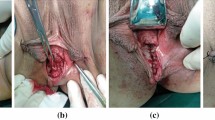Abstract
Background
The over-the-scope clip proctology system is rather new and information regarding its use for the closure of anorectal fistulas is scarce. No study has been designed to focus exclusively on its application in the treatment of rectovaginal fistulas. The aim of the study was to evaluate the feasibility, safety, and effectiveness of the clip for rectovaginal fistula repair.
Methods
From September 2014 to November 2017, consecutive patients underwent a rectovaginal fistula repair using the over-the-scope clip proctology system and were enrolled in a non-randomized prospective monocentric study. The primary outcome was fistula healing at 8 months. Secondary outcomes included assessment of morbidity and timing of rectovaginal fistula recurrence.
Results
There were 16 patients with a median age of 40.1 years. The most common causes of rectovaginal fistula were adverse events following proctectomy or pelvic radiotherapy (6 patients), obstetric trauma (5 patients) and inflammatory bowel disease (3 patients). Most participants had undergone at least two previous surgical interventions before the clipping procedure. 11 patients had a temporary diverting stoma at time of the clipping procedure. Successful primary healing of the fistula was observed in 7 (43.7%) patients. Short-term complications were rare and included pain, which occurred in 4 patients, and spontaneous clip detachment, which occurred in 2 patients. Most recurrences appeared shortly after the procedure, with a median delay of 45 days (range 16–217).
Conclusions
We demonstrated the feasibility, safety, and reproducibility of the Over-The-Scope Clip Proctology system in rectovaginal fistula repair for the patients selected. Further trials should be designed, incorporating comparisons to well-established techniques, a longer follow-up period, and a larger cohort.

Similar content being viewed by others
References
Tsang CB, Rothenberger DA (1997) Rectovaginal fistulas. Therapeutic options. Surg Clin North Am 77:95–114
Browning A, Whiteside S (2015) Characteristics, management, and outcomes of repair of rectovaginal fistula among 1100 consecutive cases of female genital tract fistula in Ethiopia. Int J Gynaecol Obstet 131:70–73
Corte H, Maggiori L, Treton X et al (2015) Rectovaginal fistula: What is the optimal strategy? An analysis of 79 patients undergoing 286 procedures. Ann Surg 262:855–861
Kirschniak A, Subotova N, Zieker D et al (2011) The Over-The-Scope Clip (OTSC) for the treatment of gastrointestinal bleeding, perforations, and fistulas. Surg Endosc 25:2901–2905
Weiland T, Fehlker M, Gottwald T et al (2013) Performance of the OTSC System in the endoscopic closure of iatrogenic gastrointestinal perforations: a systematic review. Surg Endosc 27:2258–2274
Keren D, Eyal O, Sroka G et al (2015) Over-the-Scope Clip (OTSC) system for sleeve gastrectomy leaks. Obes Surg 25:1358–1363
Magdeburg R, Kaehler G (2016) Natural orifice transluminal endoscopic surgery in humans: feasibility and safety of transgastric closure using the OTSC system. Surg Endosc 30:73–77
Winder JS, Kulaylat AN, Schubart JR et al (2016) Management of non-acute gastrointestinal defects using the over-the-scope clips (OTSCs): a retrospective single-institution experience. Surg Endosc 30:2251–2258
Niland B, Brock A (2017) Over-the-scope clip for endoscopic closure of gastrogastric fistulae. Surg Obes Relat Dis 13:15–20
Prosst RL, Joos AK, Ehni W et al (2015) Prospective pilot study of anorectal fistula closure with the OTSC Proctology. Colorectal Dis 17:81–86
Mennigen R, Laukotter M, Senninger N et al (2015) The OTSC(®) proctology clip system for the closure of refractory anal fistulas. Tech Coloproctol 19:241–246
Marinello F, Kraft M, Ridaura N et al (2018) Treatment of fistula-in-ano with OTSC(®) proctology clip device: short-term results. Cir Esp 96:369–374
Gautier M, Godeberge P, Ganansia R et al (2015) Easy clip to treat anal fistula tracts: a word of caution. Int J Colorectal Dis 30:621–624
Dubois A, Carrier G, Pereira B et al (2015) Therapeutic management of complex anal fistulas by installing a nitinol closure clip: study protocol of a multicentric randomised controlled trial—FISCLOSE. BMJ Open 5(12):e009884
McCulloch P, Altman DG, Campbell WB et al (2009) No surgical innovation without evaluation: the IDEAL recommendations. Lancet 374:1105–1112
Prosst RL, Joos AK (2016) Short-term outcomes of a novel endoscopic clipping device for closure of the internal opening in 100 anorectal fistulas. Tech Coloproctol 20:753–758
Gottgens KW, Smeets RR, Stassen LP et al (2014) The disappointing quality of published studies on operative techniques for rectovaginal fistulas: a blueprint for a prospective multi-institutional study. Dis Colon Rectum 57:888–898
Kniery KR, Johnson EK, Steele SR (2015) Operative considerations for rectovaginal fistulas. World J Gastrointest Surg 7:133–137
Acknowledgements
The authors thank Wolters Kluwer and Editage for language, grammar, and terminology checking.
Funding
None.
Author information
Authors and Affiliations
Corresponding author
Ethics declarations
Conflict of interest
Jean-Luc Faucheron has a consulting agreement with AMI, Covidien, Medtronic, Ethicon, MSD, Legrand, and Johnson & Johnson Beauté Santé France. This has had no impact on the results of this study. Yiwei Tong, Bertrand Trilling, Pierre-Yves Sage, and Edouard Girard declare that they have no conflict of interest.
Ethical approval
The study has been performed in accordance with the ethical standards as laid down in the 1964 Declaration of Helsinki and its later amendments.
Informed consent
For this type of study formal consent is not required.
Additional information
Publisher’s Note
Springer Nature remains neutral with regard to jurisdictional claims in published maps and institutional affiliations.
Rights and permissions
About this article
Cite this article
Tong, Y., Trilling, B., Sage, PY. et al. Short-term outcomes of the over-the-scope clip proctology system for rectovaginal fistula repair: a prospective study. Tech Coloproctol 23, 245–249 (2019). https://doi.org/10.1007/s10151-019-01948-5
Received:
Accepted:
Published:
Issue Date:
DOI: https://doi.org/10.1007/s10151-019-01948-5




